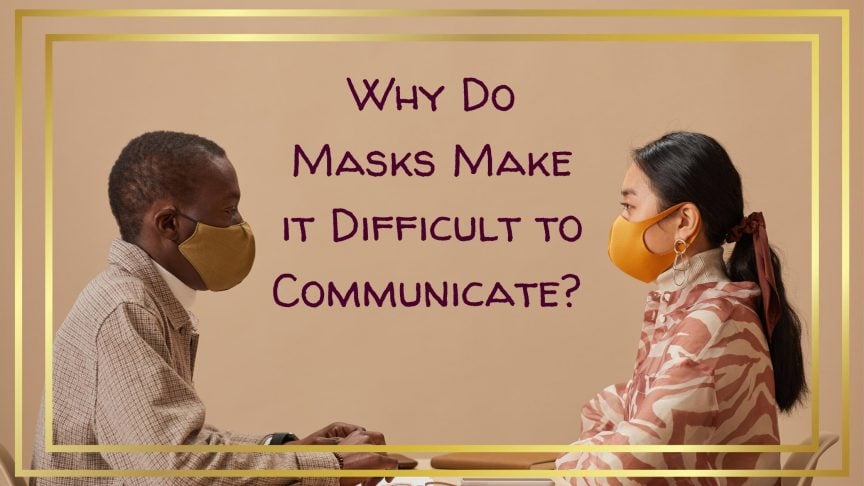- The Emotional Journey of Accepting Hearing Loss - October 25, 2024
- Making a Style Statement with Hearing Aids This Fall - October 15, 2024
- Fireplace Safety and Hearing aids - October 4, 2024
Wearing a mask has become the new normal. Health experts recommend wearing a mask during many daily activities, including shopping, getting groceries, and visiting friends. Most doctor’s offices, dentists, optometrists, and audiologists also require masks indoors. Masks are effective in slowing the spread of COVID-19, but they can make it harder to communicate. Why do masks make it harder to hear, and what can we do about it?
How Does Covering Your Mouth Affect Your Ears?
It may seem strange that wearing a face mask over your mouth and nose can make it much harder to hear. Masks seem to muffle sounds, and they can make it much harder to follow conversations. Some very tight masks may affect mouth muscles and make it harder to speak. But that’s not really what’s going on.
The Visual Connection
The difficulty we have understanding someone with a face mask is only partially about our ears and our hearing. It’s actually more about our eyes. We use a lot of visual cues when talking to those around us. When you have a conversation with a friend, family member, or grocery store cashier, you rely on your eyes to help you follow what’s being said. You see their lips moving, interpret their facial expressions, and get the gist of what they’re saying by looking at their face.
A face mask that covers the mouth and nose makes it much harder to see facial expressions and other visual cues that help you follow conversations. When you can’t see the face clearly, you’ll have a hard time hearing.
Distancing Makes it Harder to Hear
As well as wearing masks, we’re also practicing social distancing, and staying at least 6 feet apart. When you stand several feet away from someone, their voice doesn’t carry across the space as well, and you’re more likely to hear lots of background noise. This distance also makes it much harder to hear. Add the two together, and it’s no wonder masks make it difficult to communicate!
How to Communicate While Wearing Masks
Despite the challenges of communicating with a mask, there are a few ways you can make it easier to hear. Try these tips next time you’re having a conversation while wearing masks:
- Don’t start speaking until you have your friend’s attention. Make sure they know you’re talking to them by calling their name or waving.
- Stay 6 feet apart but face each other. Your voices will carry better if you’re facing towards each other.
- Speak a bit louder than normal to help your voice carry further. But make sure you don’t yell. This can distort the sound and make it harder to hear.
- Ask your friend to repeat back what you said so you know you’re on the same page.
- Since your face is covered, use more hand gestures, and nod or shake your head to help your friend know you’ve understood what they said.
- Try to have conversations in a quiet place. Having a conversation while wearing masks is challenging enough without adding background noise. If you’re meeting someone outside, try to pick a quiet spot where you can distance and wear masks and still hear each other. If it’s noisy, try moving to a quieter place.
Finally, you may be able to find a face mask with a clear plastic panel over the mouth. These still fit over the nose and mouth, but a clear plastic window lets you see more of the face and mouth. Getting these masks for you and your family can make it easier to communicate while wearing masks.
Treating Hearing Loss
Untreated hearing loss makes it hard to hear with and without a mask. It can make it harder to spend time with loved ones, chat on the phone, or enjoy seeing friends. Hearing loss also decreases your quality of life and can make you feel lonely.
Hearing aids can help you get back to doing all the things you love with the people you care about the most. You’ll hear more clearly while wearing masks, and easily hear without a mask. Don’t let hearing loss make you feel isolated. Contact us to schedule a hearing test and learn more about your hearing health!

